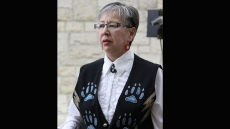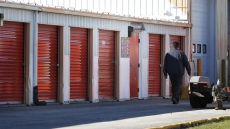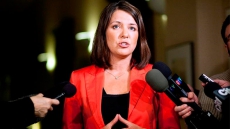TORONTO — Smoke it, toke it, vape it, eat it — marijuana, it seems, is going mainstream.
Once widely reviled by society at large as the demon weed, medical-grade cannabis is now available through federally licensed growers with a doctor's prescription and even some highly respected health organizations are calling for the herb to be legalized and sold as a taxable commodity like alcohol, in government-regulated outlets.
At the same time, Canadians also appear to be softening their attitudes towards the drug.
"They see it as more normal," says Lorne Bozinoff, president and CEO of Forum Research, which found in an August poll that 66 per cent of almost 1,800 respondents across the country supported either complete legalization or decriminalization for possession of small amounts. Just 16 per cent wanted the laws left unchanged, while 14 per cent champion the notion of stiffer penalties.
"We don't get numbers like that in polling, where two-thirds of Canadians agree on the same thing," says Bozinoff.
"In any event, a huge, huge majority of people — excluding the prime minister — are OK with either the legalization with taxation or decriminalization of marijuana," he says, referring to the Harper government's tough-on-drugs stance.
"So that's where the country's moved to, and this is a good social barometer of where the country's at."
Some health groups have also shifted their attitude towards cannabis, although their reasons are more about protecting Canadians' health.
Early this year, the chief medical officers of health for B.C., Saskatchewan and Nova Scotia called on Ottawa to rethink its marijuana control strategy, including considering regulation and taxation.
“There is clear evidence to demonstrate that the so-called war on drugs has not achieved its stated objectives of reducing rates of drug use or drug availability,” said B.C.'s Dr. Perry Kendall. “There are alternative approaches that have proved more effective in protecting public heath while not enriching organized crime and driving gang violence.”
The Canadian Public Health Association echoed that sentiment in its own policy statement, saying "Canada needs a public health approach to managing illegal psychoactive substances that de-emphasizes criminalization and stigma in favour of evidence-based strategies to reduce harm."
In October, the Centre for Addiction and Mental Health (CAMH) threw its support behind legalization, saying a few select strains of marijuana should be sold like beer, wine and spirits in outlets like the Liquor Control Board of Ontario, with strict age limits to prevent its purchase by minors.
"We are actually not favourable to what has been happening in Colorado and Washington," said Jurgen Rehm, director of social and epidemiological research at CAMH, referring to the first two U.S. states to legalize weed (Alaska, Oregon and Washington, D.C., recently followed suit.)
In Colorado, for instance, pot is sold in stores with few restrictions and even advertised on TV, said Rehm, likening the state's wide-open legalization to the Wild West.
CAMH wants to see only a few varieties sold in regulated outlets, and only those that contain moderate levels of THC, the main psychoactive substance in grass, said Rehm, noting that the drug carries a number of dangers, including fatalities when stoned drivers get behind the wheel and the risk of developing dependence.
"Let's do it correct from the beginning. Let's not say this is a harmless drug, nothing will ever happen. No, it is a drug, it has consequences. They may be less than with alcohol, but it's still a pretty severe consequence."
Marc Emery, the self-styled "Prince of Pot" who returned to Canada in August after more than four years serving a U.S. prison sentence for selling cannabis seeds to Americans, says the city he calls home offers a good model for the rest of the country.
"Vancouver right now is closest to how legalization would look in many ways than any of the legal jurisdictions like Washington State or Colorado or even Alaska and Oregon," he says.
"The reason I say that is because we have very little crime related to marijuana use, and yet we have over 60 dispensaries now selling marijuana and most of them sell 10 to 20 different varieties, and it's priced cheaper in Vancouver than any other place in the western hemisphere."
In Vancouver, a gram of weed sells for $5 on average; next-door in Washington state, the same quantity goes for $28 in government licensed stores, says Emery, whose Cannabis Culture store sells pot-related products but not cannabis itself.
While marijuana remains illegal, he says there seems to be a detente with Vancouver police, who tend to look the other way when it comes to simple possession.
"The results are in — there's very little social negative byproduct as a rule of this proliferating marijuana market. It attracts nice tourists, it attracts people from the rest of the province, it provides a lot of cash to the neighbourhoods and everybody's very well-behaved because no one wants to rock that boat."
Politically, the normalization of marijuana was also given a boost last year when federal Liberal Leader Justin Trudeau came out in favour of legalization, a position met with a flurry of attacks by the Harper government, which has remained steadfast in its opposition to softening the law.
While the New Democrats want to see decriminalization, Justice Minister Peter MacKay has said his Conservative government is considering stricter enforcement of marijuana laws, including possibly making possession of small quantities of dope a ticketing offence.
The pollster Bozinoff believes the Tories are out of step on the issue.
"I think they thought they had caught Justin Trudeau in a gotcha moment. They made a big deal over the whole marijuana thing, and no one cared, as the numbers showed."
Indeed, the government's change in medical marijuana regulations, which designates licensed producers to supply the drug via a doctor's prescription, has also bolstered the argument for legalization because proponents can point to a specific example of Canadians who've been given legal access, he says.
"When something is allowed for one small group, the taboo is broken. It's allowed and it's no big deal. The world didn't end."
Rehm also believes the change in how medicinal pot is supplied has opened a "sort of side door" to legalization, which he predicts could occur as early as next year if the Liberals win the federal election slated for October.
"If you legalize it or you don't legalize it, it will be even wider used," he says. "Right now, we already have 42 per cent of all Ontarians below 30 using it. If you look at lifetime prevalence, it's in the 70s (per cent).
"This is a normalized behaviour. It may be officially prohibited, but it is what most young people at some point in their lives have experienced and this is to some point irreversible."






